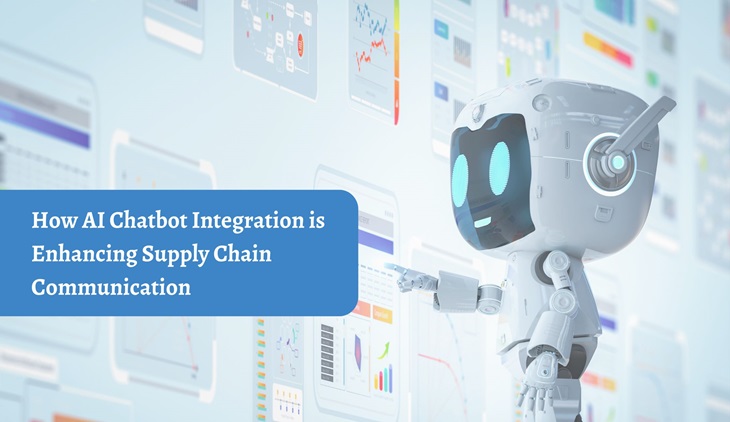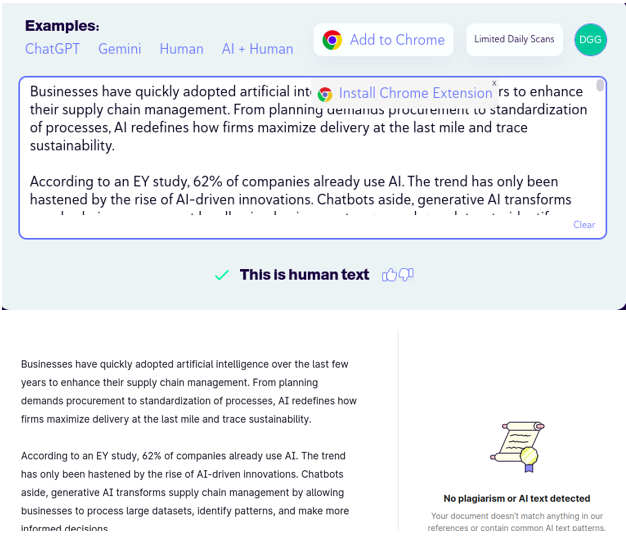
Over the last few years, businesses have quickly adopted artificial intelligence to enhance their supply chain management. From planning demands to procurement to process standardization, AI redefines how firms maximize delivery at the last mile and trace sustainability.
According to an EY study, 62% of companies already use AI. The rise of AI-driven innovations has only hastened this trend. Chatbots aside, generative AI transforms supply chain management by allowing businesses to process large datasets, identify patterns, and make more informed decisions.
This technology can optimize workflows across supply chains, reduce errors, facilitate transmission between suppliers, manufacturers, and logistics providers, and improve efficacy.
AI chatbot integration in the supply chain continues with chatbots. It can be applied to many aspects, including demand forecasting, inventory management, predictive maintenance, fraud detection, and sustainability.
While generative AI analyzes massive datasets to uncover patterns, businesses can use this insight to make more informed decisions and optimize their workflows within their supply chains.
The Changing Domain of Supply Chain Management
Supply chain management is one of the most profound transitions to improve agility, transparency, and adaptability. PWC said that with today’s dynamic business world, traditional supply chains focused on efficiency and cost optimization are replaced by agility strategies.
Companies are leaning toward agility and immediacy to adjust for particular disruptions or uncertainties from the start. The increasing complexities and disruptions in an increasingly global supply chain exacerbate the need for visibility and control.
A broad strategy combining AI chatbot development, data analytics, and digital enablers enables businesses to be more nimble and immediate. This transition is evolving the effort from cost-cutting alone to enhancing risk management and resilience.
Critical Applications of AI Chatbot Integration in Supply Chain Management
AI transforms supply chain management by contriving efficiency, innovation, and agility across miscellaneous processes.
1. Enhanced Logistics and Transportation
AI disrupts supply chain management for the best efficiencies, innovations, and agility at each step when managed well. Utilizing AI for route optimization can help cut transportation costs and increase delivery efficiency by traffic and vehicle capacity at an accurate real-time level, as well as route tracking, enhancing visibility to reduce delays in real-time.
2. Predictive Maintenance and Quality Control
AI integration services like quality control and predictive maintenance are used elsewhere. Machine learning, AI, and predictive analytics assess historical data & past market patterns in predictive analytics to improve demand forecasting and optimize manufacturing and fulfillment cycle inventory to ensure product delivery on time and enhance productivity.
3. Efficient Inventory Management
The common denominator in advanced analytics is using the same services and end services to optimize stock management and balance holding costs vs. customer service levels. Being able to track demand in real time lets you forecast demand accurately. Automation speeds up order procurement and fulfillment, making the process more efficient.
4. Computer Vision
Computer vision is fueled by inventory management, quality control, and warehousing automation by keeping track of inventory levels, identifying products, and looking for real-time discrepancies to improve everything. AI chatbot integration can also check products for imperfections so that only the cleanest shipments make it to your clients. Computer vision helps robots and self-driving cars in warehouses from a pedestrian, leading to better efficacy and lower labor costs.
5. Natural Language Processing (NLP)
Supply chain NLP can forge significant steps for enhancing order management, communication across the chain, and data insights for predictive maintenance. Customers can place orders, ask questions, and receive customer service from bots. NLP bolsters communication between supply chain participants and data analysis to forecast trends organizations can use to make educated decisions.
Benefits of AI Chatbot Integration in Logistics and Supply Chain
Applying AI chatbot development in the supply chain and logistics industry offers businesses and customers various advantages. The advantages of artificial intelligence in the supply chain are:
1. Decreased Operational Costs
Artificial intelligence checks data and identifies the essential actions to take. It allows businesses to automate everyday tasks that require human approval. AI will enable companies to reduce human labor costs in the supply chain while still having a chance at success.
2. Reduced Shipping Time
AI in logistics and supply chain supports decisions about truck routes, truck speeds, and delivery times. Trucks can use GPS and super-routing algorithms to determine a company’s best route. It saves time and decreases fuel usage as well as carbon emissions. Real-time tracking of shipments by digital tools is how IT allows you to keep insights into where the packages are at every moment. Companies can track locations and the condition of their wares during a journey. It offers visibility and enables swift response to any delay or problems.
3. Reduced Waste and Overstocking
AI integration services can reduce overstocking and waste in logistics companies. AI algorithms that analyze inventory data, demand, and other factors help logistics companies optimize inventory and reduce waste. This optimization reduces costs and increases overall efficiency.
4. Improved Delivery Accuracy and Speed
AI can be a big help in pinching delivery accuracy and speed. Optimized through AI, logistics companies can study and scrutinize the locations of delivery locations’ data levels, other dashboards, etc., to optimize the delivery routes and calendars, which may help with better planning, thereby reducing error speed and increasing efficiency.
5. Seamless Customer Service
AI chatbot integration helps with real-time order tracking, personalized communication, and fast issue resolution in the supply chain, making seamless customer service possible. Chatbots and virtual assistants offer 24/7 support, answering questions and updating the status anytime. Predictive analytics can help predict what customers require and what needs to be in stock so they don’t run out, ensuring an excellent customer experience.
Conclusion
Integrating AI can help businesses be more efficient, cut costs, and increase customer satisfaction. AI can provide companies with real-time visibility and optimized decision-making for predictive maintenance, intelligent supplier management, and demand forecasting, among its most important technologies. The long-term payoff is greater than the up-front investment required to implement AI chatbot development, while execution comes with a few challenges.
AI Report

Dupli Checker
https://drive.google.com/file/d/1BfZEkQlLo9iub4fP5NC3hvpOV28bpNoH/view?usp=sharing









